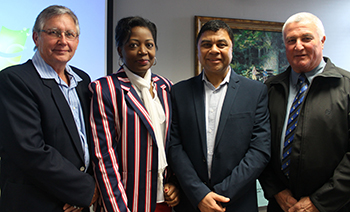
From the left: Prof Danie Vermeulen, Dean of the
Faculty of Natural and Agricultural Sciences;
Prof Kahilu Kajimo-Shakantu, Head of the Department
of Quantity Surveying and Construction Management;
Prof Francis Petersen, Rector and Vice-Chancellor
at the UFS; and Dr Franco Geminiani, chairing the
panel from the South African Council for the Project
and Construction Management Professions.
Photo: Leonie Bolleurs
Achieving programme accreditation from the respective professional bodies is the ultimate goal for the Department of Quantity Surveying and Construction Management at the University of the Free State (UFS). This is according to Prof Kahilu Kajimo-Shakantu, the head of this department. This hallmark of quality reflects the university’s aspiration towards excellence.
Construction Management programmes reviewed
The university recently received a visit by a panel, representing the South African Council for the Project and Construction Management Professions (SACPCMP) to re-accredit programmes offered by the Department of Quantity Surveying and Construction Management. During the accreditation visit, the panel evaluated the programmes to determine whether they met the minimum requirements according to a set of pre-determined criteria.
When reviewing the programmes: BSc and BSc Hons Construction Management respectively, as well as the Project Management stream of the Masters programme in Land and Property Development Management (MLPM), the panel looked at programme design and outcomes including curriculum, study material and exam papers, institutional support, student recruitment, admission, development, retention and throughput, staffing recruitment and development, teaching and learning strategies, quality assurance, facilities, infrastructure and resources, professional development, industry and practical exposure and postgraduate policies, procedures and regulations, including research activities.
If the minimum requirements are achieved, the Department of Quantity Surveying and Construction Management at the UFS will receive accreditation for its programmes from 1 April 2017 to 31 March 2022.
It will also mean that we are certified
as producing quality employable
graduates who are well prepared to
enter the industry and make a difference.
Currently, the department has full accreditation by the SACPCMP (until March 2017) and the SACQSP (until December 2017).
Later this month, a panel from the South African Council for Property Valuation Profession (SACPVP) will review the accreditation of the Valuation stream of the MLPM programme. The South African Council for Quantity Surveying Profession responsible for accrediting the Quantity Surveying programmes will visit the university in 2018.
Certified as producing quality students
Prof Kajimo-Shakantu said: “If we maintain our accreditation, it will reflect that the UFS is among the best, with programmes which are recognised by professional bodies that set competence standards for professional registration of students. It will also mean that we are certified as producing quality employable graduates who are well prepared to enter the industry and make a difference. The programmes contribute to the development of the much-needed critical skills in the built environment.”